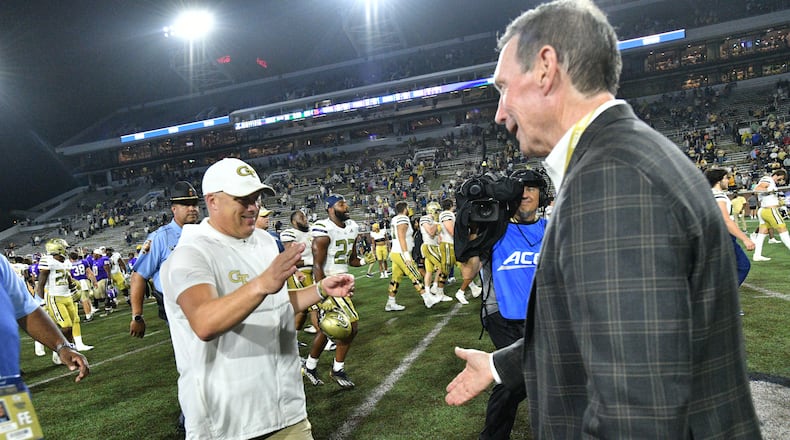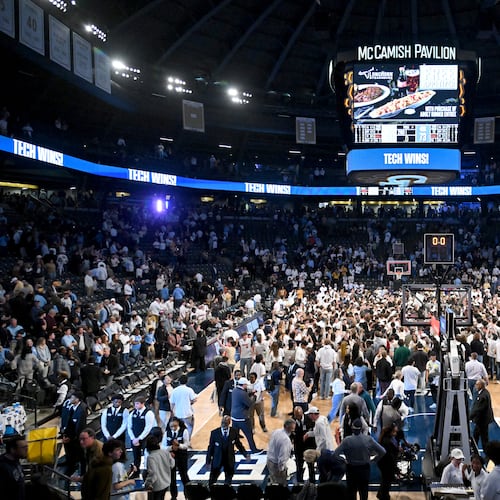About a year ago, Georgia Tech President Ángel Cabrera sang the praises of then-athletic director Todd Stansbury. Up for his annual performance review in February 2022, Cabrera affirmed Stansbury for his leadership of the athletic department throughout 2021 – as the forces of the pandemic, the transfer portal and the rule changes that permitted athletes to be compensated for their name, image and likeness unsettled the world of college athletics.
“I thank you for leading the program throughout this time of transformation and doing so without accruing losses or increasing our outstanding debt – a result not many programs achieved this year,” Cabrera wrote.
There was one particular issue that Cabrera raised in the annual performance evaluation, dated Feb. 24, 2022 and obtained through an open-records request that was made Sept. 27, 2022 and received Feb. 10. (By state law, University System of Georgia sports programs are required to respond to records requests within 90 business days.)
“My biggest concern this year was our poor performance in football, which is worrisome given its outsized impact on our reputation, student and alumni engagement, and the revenues of the entire program,” Cabrera wrote.
Cabrera’s concern with then-coach Geoff Collins’ team, and his raising it with Collins’ boss, speaks to his decision to dismiss both the coach and AD after the Jackets began the 2022 season in calamitous fashion. Cabrera was quite willing to credit Stansbury for the many successes achieved by the Tech athletic department in 2021, such as the strong seasons of several teams, Jackets athletes’ academic performance and Stansbury’s fundraising and budgeting efforts. But, months before the start of the fateful 2022 season, Cabrera’s assessment of the football team – and its potential impact – made clear that he placed ultimate responsibility for the program with Stansbury, who late in the 2021 season affirmed Collins as “my man.”
“Since the change in coaches and system three seasons ago our results have been consistently poor, with a 9-25 overall record,” Cabrera wrote. “While it is reasonable to expect a leadership and system change to impact performance, the last three years have produced the worst three-year record since we joined the ACC forty years ago. Clearly you cannot control the outcomes of specific games, but these numbers indicate a problematic trend which, unless reversed, has the risk of damaging the whole athletic program, no matter the successes elsewhere.”
Like much of the fan base, Cabrera had a far different view of Collins, the football team and Stansbury’s oversight of the program two years earlier, in an annual performance review of the 2019 year, which was both Collins’ and Cabrera’s first at Tech in their respective positions. In a letter dated Feb. 17, 2020, Cabrera highlighted Stansbury’s support of Collins in his first season, “which has generated a great deal of positive attention and has helped energize our campus and fan base. The ‘404/ATL takeover’ campaign has been refreshing and effective in not just supporting the football program but helping position the overall Georgia Tech brand.”
In the two annual reviews received in the open-records request, public perception was a topic that Cabrera visited multiple times. In the same 2019 review, he wrote that the men’s basketball team’s NCAA sanctions, the firing of women’s basketball coach MaChelle Joseph (who later sued the institute alleging sex discrimination), as well as a lawsuit filed by Oregon State against Stansbury for failing to pay back a buyout owed the school for taking the job at Tech “have been the unfortunate source of negative news coverage this past year.” Cabrera added that he believed that Stansbury’s communication style could “help us shift public attention and media coverage in a more positive direction that is focused on our athletic performance and not our programmatic issues.”
In Stansbury’s final days as AD of his alma mater, he appeared to have infrequent communication with Cabrera. According to Tech’s response to an open-records request for copies of all written communications and a log of phone calls between Sept. 1-19 between the two men, there were two instances of such communication. (That request was made Sept. 19 and filled Feb. 1-2.)
One was an email from Cabrera to Stansbury on Sept. 14.
“Great communication piece!” Cabrera wrote to Stansbury regarding an update he had sent out in an email that highlighted Tech’s transfer-portal activity (the fewest portal entries among all ACC schools in the 2021-22 academic year) and the institute’s celebration of the 50th anniversary of Title IX.
The other was an eight-minute phone call from Cabrera to Stansbury on Sept. 18, the morning after the 42-0 loss to Ole Miss. Nine days later, Cabrera spoke at a news conference following the dismissals that cleared the way for the hires of new AD J Batt and coach Brent Key. In January, Stansbury was hired at N.C. State as its deputy AD overseeing internal operations and football.
“I particularly want to thank Todd for his unwavering commitment to the success of our student-athletes, his dedication to our signature Total Person approach to athletics and his love for our alma mater,” Cabrera said. “Ultimately, though, the results haven’t been there and a new approach is necessary to return our program to where it belongs.”
About the Author
Keep Reading
The Latest
Featured



